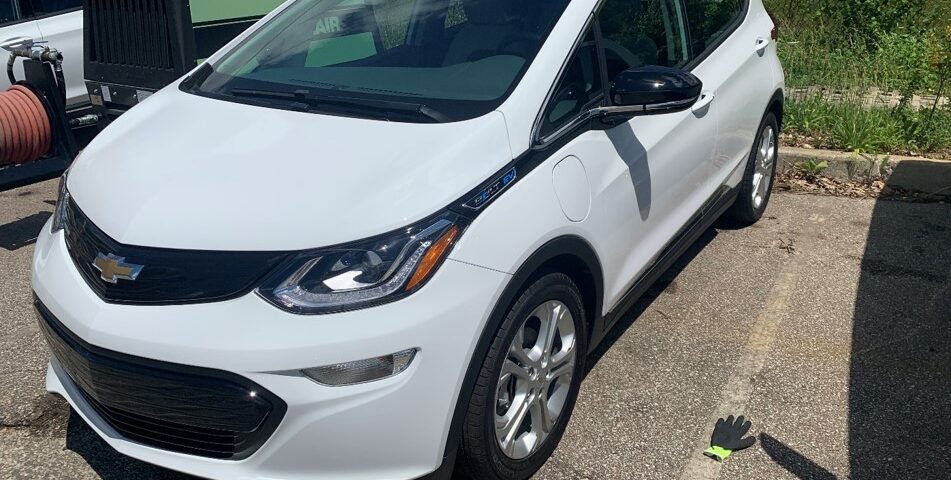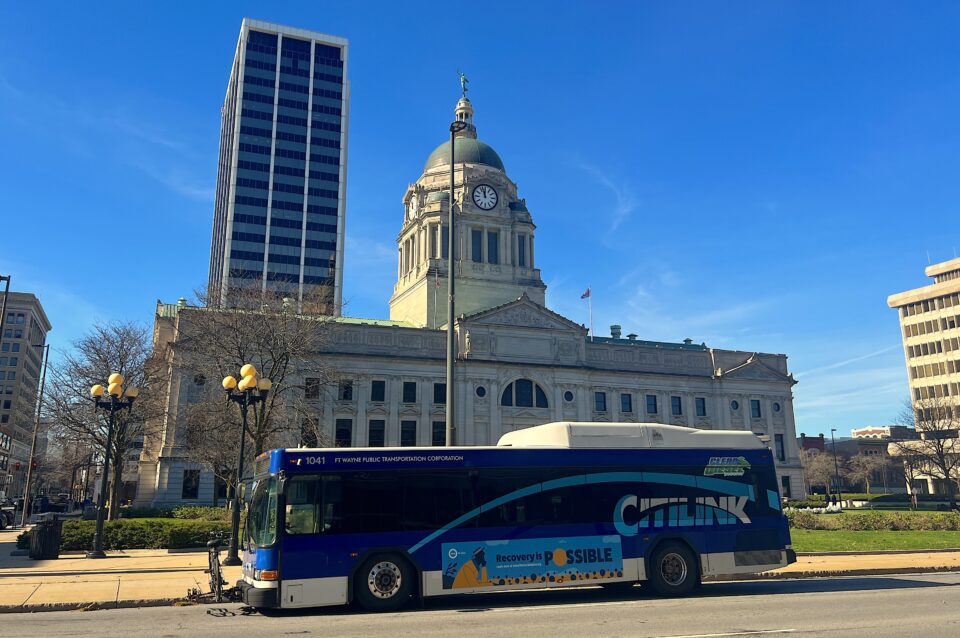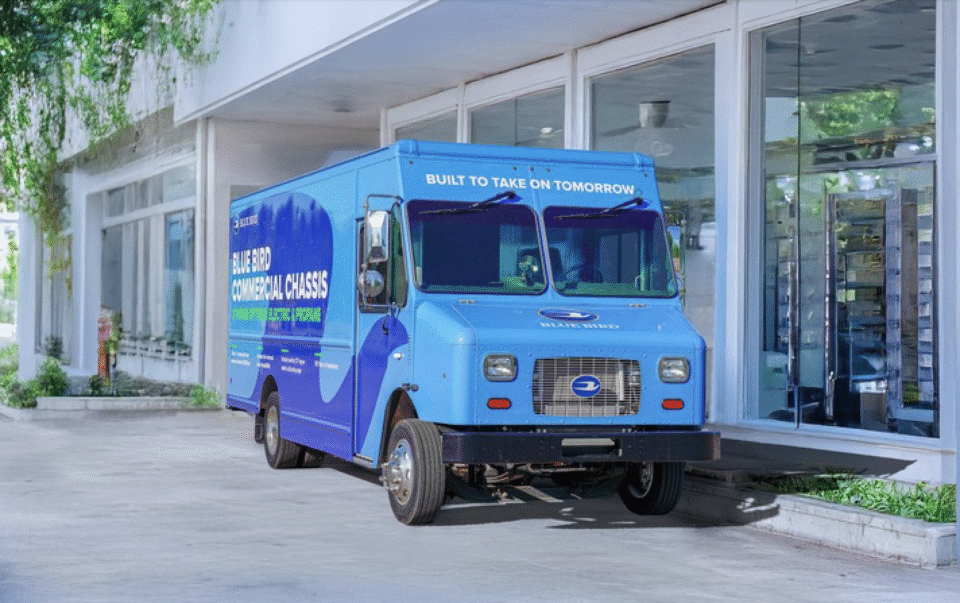The City of Bloomington: A Sustainable Leader

The transportation sector is among the top generators of greenhouse gas emissions in Indiana and a leading contributor of emissions nationwide. Many cities throughout the United States have created climate goals aimed at reducing their greenhouse gas emissions. The City of Bloomington, with its broad range of climate initiatives, strives to lead in municipal sustainability in Indiana.
The City of Bloomington is implementing plans to reduce its greenhouse gas emissions by conserving water and energy, installing green infrastructure projects and enhancing multimodal transportation across Bloomington, strengthening the City’s environmental and economic sustainability, while reducing long term operating costs. Bloomington is a member of the Climate Mayors initiative, a collaboration of more than 400 mayors working together to demonstrate leadership on climate issues. The City is also developing a Climate Action Plan, setting short- and long-term goals to reduce greenhouse gas emissions based on their latest community greenhouse gas inventory.
 One focus of the City of Bloomington’s climate initiatives is electrification of the City’s fleet. In 2019, Bloomington Transit was approved for grant funding to support the purchase of two new fully electric buses through a Low-No Emissions grant from the Federal Transit Administration. In June 2020, the City’s Public Works Department added the first all-electric Chevy Bolts to Bloomington’s fleet to replace conventional vehicles. This year, the City of Bloomington Police Department also purchased 10 hybrid Ford Police Interceptor patrol vehicles which will reduce engine idling time, increase fuel economy, and reduce fuel costs for the department and the City.
One focus of the City of Bloomington’s climate initiatives is electrification of the City’s fleet. In 2019, Bloomington Transit was approved for grant funding to support the purchase of two new fully electric buses through a Low-No Emissions grant from the Federal Transit Administration. In June 2020, the City’s Public Works Department added the first all-electric Chevy Bolts to Bloomington’s fleet to replace conventional vehicles. This year, the City of Bloomington Police Department also purchased 10 hybrid Ford Police Interceptor patrol vehicles which will reduce engine idling time, increase fuel economy, and reduce fuel costs for the department and the City.
Lauren Travis, Assistant Director of Sustainability for the City of Bloomington, said “Bloomington continues to invest in fleet electrification to ensure that the City has diverse and sustainable mobility options.” The City’s fleet currently has a variety of alternative fuel vehicles, including all-electric, hybrid electric, and flex fuel vehicles capable of using gasoline and E85 fuel. In addition to Bloomington’s green fleet vehicles, the City licensed three electric scooter vendors to operate in Bloomington.
The main obstacle the City of Bloomington faced when implementing fleet electrification was to systemize the procurement and sourcing of electric vehicles. To overcome this challenge, Bloomington participated in the Climate Mayors Electric Vehicle Purchasing Collaborative. Through the Collaborative’s procurement portal, the City of Bloomington was able to review competitive vehicle pricing in a transparent way and calculate the estimated savings over time. The process of procuring electric vehicles through the Climate Mayor’s collective purchasing arrangement was clear, simple, and cost effective, accelerating the fleet transition towards electrification.
The City of Bloomington has implemented robust policies to promote the development of electric vehicle infrastructure. This year, the City of Bloomington adopted a new Unified Development Ordinance with requirements that new parking areas in certain zoning districts include dedicated electric vehicle parking spaces. As technology and emerging forms of transportation like ride sharing, autonomous vehicles and electric vehicles advance, the City will be responsive to resident’s evolving transportation needs.
To further promote the use of electric vehicles and meet the growing demand of its population, the City is expanding its current electric vehicle infrastructure. During the initial phases of construction on two new municipal parking garages, the City of Bloomington included conduit for Level 2 electric vehicle chargers. Over the next few years, further improvements to the City’s transportation system are planned, helping the City of Bloomington continue to work towards reducing fuel and emissions use.
The City of Bloomington has been a long-standing Leader Member of Greater Indiana Clean Cities and supports our efforts and mission to advance alternative, domestic fueled transportation including energy efficient technologies across all sectors in Indiana. Lauren Travis, Assistant Director of Sustainability for the City of Bloomington, is a valued Greater Indiana board member.
The City of Bloomington’s Department of Economic & Sustainable Development’s mission is to foster a livable and economically resilient community through partnerships, collaboration and outreach. Through strategic initiatives that expand economic opportunities, the Department aims to preserve the health of our environment, provide for social equity to the citizenry, and advance the principles of sustainable development.
Greater Indiana is a Clean City Coalition focused on advancing communities with education and resources on alternative fuel vehicles. The standalone nonprofit 501(c)3 organization serves 74 counties, working with public and private sector members. Greater Indiana is a resource for members integrating alternative fuels, technologies, and efficiency measures. Greater Indiana hosts educational and networking events fostering opportunities for partnerships between fleets and industry providers. By facilitating these partnerships and projects, Greater Indiana is fostering the economic, environmental, and energy security of the United States.




